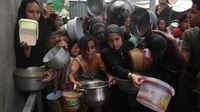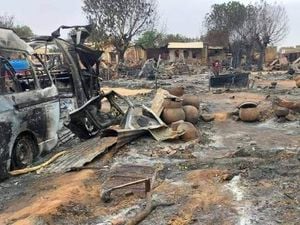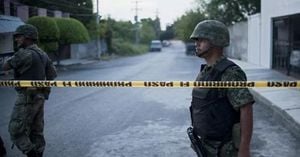On August 22, 2025, the United Nations officially declared a famine in Gaza, marking the first time such a designation has been made in the Middle East. The announcement, made by the Integrated Food Security Phase Classification Initiative (IPC) and reported by outlets such as AFP, NPR, and Xinhua, confirmed that famine conditions—Phase 5, the most severe level of acute food insecurity—are present in Gaza Governorate, including Gaza City. This area comprises about 20 percent of the Gaza Strip and is home to nearly one million people.
The IPC panel’s findings are stark: over half a million people are now facing catastrophic conditions characterized by starvation, destitution, and death. The report warned that famine is likely to spread to the Deir el-Balah and Khan Yunis governorates by the end of September, with the number of people starving expected to rise to 641,000. "Over half a million people in the Gaza Strip are facing catastrophic conditions characterised by starvation, destitution and death," the IPC report stated, as cited by France24.
For many, these numbers are more than just statistics. In July alone, more than 12,000 children were identified as acutely malnourished—a six-fold increase since January, according to UN agencies. UNICEF Executive Director Catherine Russell described the heartbreaking reality: "The signs were unmistakable: children with wasted bodies, too weak to cry or eat, babies dying from hunger and preventable disease." The IPC further noted that at least 132,000 children under five are at risk of death from acute malnutrition in the coming year, as reported by NPR.
This crisis, according to the IPC and echoed by the International Red Cross, is entirely man-made. The IPC’s Famine Review Committee pointed to a sharp escalation of conflict since July, massive displacement since mid-March, and restricted access to food as the main drivers. The local food system has collapsed: 98 percent of cropland is damaged or inaccessible, livestock has been decimated, and fishing is banned. Aid agencies have struggled to gather information amid the chaos, and the IPC warned that their figures are likely an underestimate.
The UN and aid groups have repeatedly called out the systematic obstruction of humanitarian aid deliveries to Gaza. Tom Fletcher, the UN’s emergency relief coordinator, didn’t mince words: "It is a famine: the Gaza famine." He blamed Israel directly, saying, "It is a famine that we could have prevented if we had been allowed. Yet food stacks up at borders because of systematic obstruction by Israel." According to the IPC, Israel completely banned aid supplies from Gaza in early March, before permitting only limited quantities to enter at the end of May. This has led to severe shortages of food, medicine, and fuel.
Israel, for its part, has categorically rejected the famine designation. The Israeli foreign ministry stated, "There is no famine in Gaza," calling the IPC’s findings "based on Hamas lies laundered through organisations with vested interests." The ministry insisted that "a massive influx of aid has flooded the Strip with staple foods and caused a sharp decline in food price." The Israeli defence ministry body COGAT, which oversees civil affairs in the Palestinian territories, echoed this sentiment, dismissing the IPC’s report as inaccurate and based on partial data. "COGAT firmly rejects the claim of famine in the Gaza Strip, and particularly in Gaza City. Previous reports and assessments by the IPC have repeatedly been proven inaccurate and do not reflect the reality on the ground," COGAT said, as reported by BSS/AFP.
The IPC panel, however, is widely regarded as the "gold standard" for food security assessments, according to Jean-Martin Bauer, director of the UN World Food Programme’s food security analysis. Aid groups and the UN have long warned of a deteriorating humanitarian situation in Gaza, particularly as Israel has stepped up its offensive against Hamas. Israel blames the food crisis on Hamas, accusing it of hijacking aid, though, as NPR noted, no public evidence has been presented to support these claims and aid groups have not reported systemic theft.
The famine declaration comes amid ongoing conflict and political maneuvering. Israeli Prime Minister Benjamin Netanyahu announced on August 21, 2025, that he had approved military plans to seize Gaza City and had instructed officials to begin "immediate negotiations" for the release of hostages and an end to the war—albeit on terms acceptable to Israel. Netanyahu outlined five conditions for ending the offensive: Hamas’s disarmament, the release of hostages, Gaza’s demilitarization, Israeli security control over the enclave, and the appointment of a non-Hamas body to run daily life in Gaza. The Israeli military has mobilized 60,000 reservists, with plans to call up 20,000 more in the coming days, and continued bombardments have resulted in significant casualties. According to Gaza health authorities, at least 70 people were killed and 356 wounded in recent strikes, bringing the death toll since October 7, 2023, to 62,192, with over 157,000 wounded.
Meanwhile, Hamas has agreed to a proposal put forward by Egyptian and Qatari mediators for a temporary truce and the release of hostages. Israel has yet to publicly issue an official response to this proposal, and no Israeli delegation is expected to depart for negotiations in Doha or Cairo at this stage, according to Xinhua and Ynet.
The humanitarian organizations and the UN have been unequivocal in their calls for action. The International Red Cross described the declaration of famine as "devastating and entirely foreseeable." Under international humanitarian law, they emphasized, Israel, as the occupying power, must ensure that the basic needs of Gaza’s civilian population are met. UN rights chief Volker Turk went further, stating, "It is a war crime to use starvation as a method of warfare." UN Secretary-General Antonio Guterres added his voice, calling for an immediate ceasefire and full humanitarian access to Gaza: "We cannot allow this situation to continue with impunity."
The IPC’s Famine Review Committee stressed that the crisis can still be halted if immediate action is taken. "Starvation is present and rapidly spreading. Any further delay—even of days—will result in an unacceptable escalation of famine-related deaths," the report cautioned. Without a ceasefire and large-scale humanitarian access, alongside urgent restoration of food supplies and basic health, nutrition, and WASH (water, sanitation, and hygiene) services, avoidable deaths will rise exponentially.
As the world watches, the situation in Gaza serves as a grim reminder of the human cost of protracted conflict and political deadlock. The famine declaration, the first in the region’s history, is a call to action—one that, as Tom Fletcher warned, "should haunt us all."





